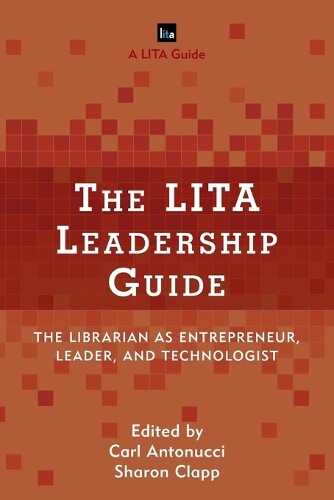
The LITA Leadership Guide: The Librarian as Entrepreneur, Leader, and Technologist
(Paperback)
Available Formats
Publishing Details
The LITA Leadership Guide: The Librarian as Entrepreneur, Leader, and Technologist
By (Author) Carl Antonucci
Edited by Sharon Clapp
Bloomsbury Publishing PLC
Rowman & Littlefield Publishers
21st April 2017
United States
Classifications
Professional and Scholarly
Non Fiction
025.0068
Physical Properties
Paperback
152
Width 150mm, Height 230mm, Spine 12mm
236g
Description
The LITA Leadership Guide from the American Library Association division charged with information technology brings together three important professional development topics -- leadership, entrepreneurship, and technology -- in one volume, uniting theory, practice, and case studies from experienced colleagues in the field. Topics include: cultivating creativity, career pivots, forecasting and planning for change, keeping tech and leadership skills ahead of the curve, and incorporating lessons and knowledge from across sectors. Additional concepts include: professional development, evaluating risk, overcoming barriers to innovation, and seeding success in your career and organization. The book will help librarians at every level of the career ladder and will supplement leadership and skill-based training workshops. Library leadership teams interested in the development of their staff as a means of improving their organizational performance will find this book to provide context for growth, training, and collaboration. This book provides big-picture concepts that affect the many stages of a librarians career: Librarian as Leader, Librarian as Entrepreneur, and Librarian as Technologist and thus is suitable for staff development, discussion groups, or courses. This LITA Guide will help librarians understand how to chart their career development across these three foundational platforms, and become familiar with how peers have successfully created positive change for themselves, and their libraries, as leaders, entrepreneurs, and technologists
Reviews
In addition to exploring the traditional leadership role of a library director, this work by Antonucci and Clapp proposes models of librarians as leaders in technology and entrepreneurship. According to the authors, libraries are conservative organizations, often at odds with risk-takers and disrupters, much of that disruption coming as a result of technological innovation. The book begins with an examination of open-source software, the adoption and abandonment of new technologies and software, and the impact of technology on libraries operations and overall mission. The entrepreneurial spirit in librarianship is defined not by taking the considerable financial risk of operating a new and untried business but by shaking up the tradition organizational model. At risk is the very character of a library. Is it a library if there are no physical books What if there is no dedicated physical location The librarian/entrepreneurs here havent quite reached that level of disruption, but those questions are in the air as large physical collections shrink and space in library buildings is dedicated to other uses. Verdict: Recommended reading for all librarians. * Library Journal *
Practical tips illustrated with case studies provide valuable advice on how to position libraries to support campus priorities. Antonucci and Clapp offer a holistic way of thinking that will help leaders anticipate and address obstacles in this process. -- Sharon Weiner, Interim Associate Dean for Academic Affairs and Professor of Library Science and W. Wayne Booker Chair in Information Literacy, Purdue University Libraries
An essential treatise for the 21st century library leader. Each chapter is a revelation and a guide to action and innovation. Brings together theory, practice and case studies that educate and motivate. -- Jim Neal, University Librarian Emeritus, Columbia University
This volume offers a variety of strategies for practicing librarians who want to maximize their talent for success. Various chapters provide multiple ideas, solutions, and sometimes down right common sense. This resource guide will be a valued addition to any LIS professional development collection. Some chapters may be useful for the new LIS professional or students in the LIS classroom. A "must-read" for librarians looking to the future. -- Em Claire Knowles, Assistant Dean for Students and Alumni Affairs, School of Library and Information Science, Simmons College
Read these chapters to learn from the experiences of the authors and to consider where there might be applications fro you in your own practice. -- Maureen Sullivan, consultant and 2012-2013 president of the American Library Association
Author Bio
Carl Antonucci, Ph.D., director of library services, Central Connecticut State University, has been employed in library services in higher education since 1993. He is a member of the planning committee for Connecticut Library Leadership Conference and is the ALA chapter councilor from Connecticut, and was selected to be a mentor at the 2015 New England Library Associations Leadership Symposium. Sharon Clapp, digital resources librarian, Central Connecticut State University, is a systems librarian, web developer, and user experience advocate. She frequently presents on topics related to technology and disruptive change in librarianship.
